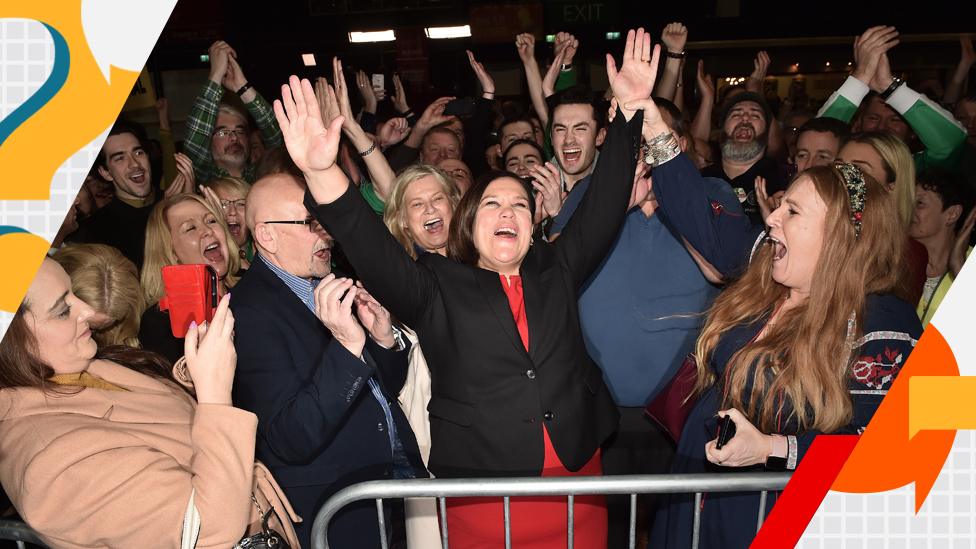Irish general election: Will love be in the air for Ireland's political parties?
- Published
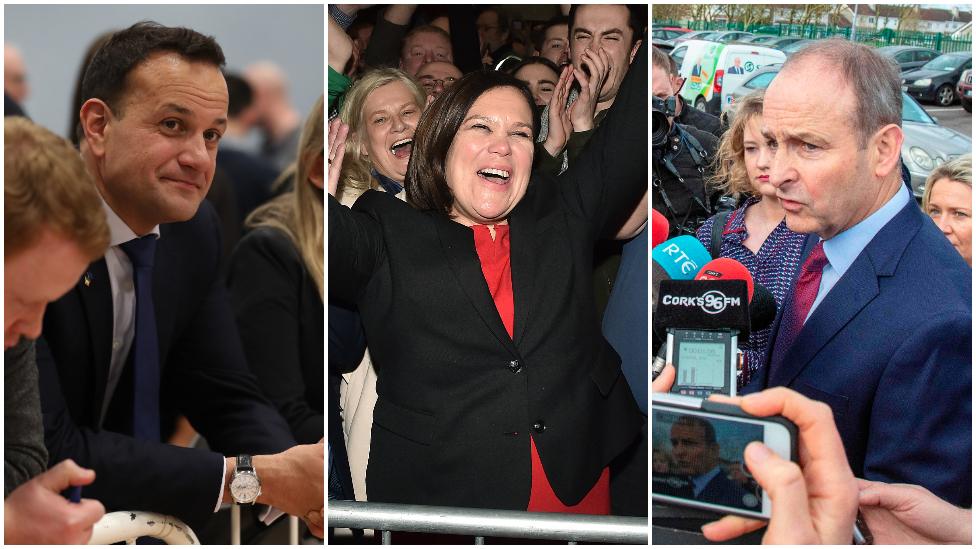
It remains to be seen who between Leo Varadkar (Fine Gael), Mary Lou McDonald (Sinn Féin) and Micheál Martin (Fianna Fáil) will lead a new Irish government
St Valentine's Day starts the weekend at a time when Ireland's political parties are involved in a form of speed dating that they hope will lead to the formation of a government.
After the election no party is close to the magic figure of 80 seats and a Dáil (Irish lower house) majority.
Fianna Fáil has 38 seats, Sinn Féin 37, Fine Gael 35, the Greens 12, the Social Democrats 6, Labour 6, Solidarity-People Before Profit 5 and others 21.
Any stable majority must involve two of the three big parties with most likely the Greens.
'Tweedledum and Tweedledee'
Sinn Féin believes people voted for change and that means it should be in government because people are sick of the two big centrist parties - Tweedledum and Tweedledee - as the party's leader Mary Lou McDonald calls Fianna Fáil and Fine Gael - that have dominated politics here for the best part of a century.
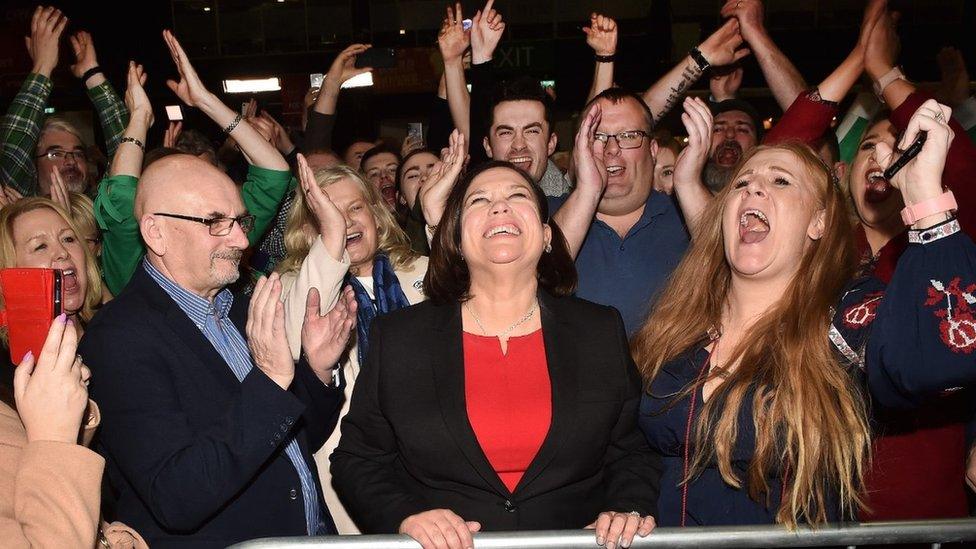
Both were part of the original Sinn Féin before it split in the aftermath of the Irish Civil War.
The problem for the current Sinn Féin is that both the Fianna Fáil leader Mícheál Martin and Leo Varadkar, his Fine Gael counterpart, have ruled out going into coalition with Sinn Féin.
This is despite the fact that the party got the highest popular vote and would have had the same number of seats as Fianna Fáil had it not been for the automatic return of a Fianna Fáil ceann comhairle (speaker).
Sinn Féin would have been the biggest party in the Dáil if it had run more candidates; it didn't foresee the scale of the surge in its support.
BBC News NI look at the options after there was no overall majority in the Republic of Ireland's general election
During the course of the campaign Fine Gael said Sinn Féin's policies on economics and crime were incompatible with their own; to which Fianna Fáil added its concerns about the "shadowy influence" of former IRA prisoners in Belfast.
But after the election Mícheál Martin, the only Fianna Fáil leader not to have been taoiseach (prime minister) hinted he might be prepared to look again at coalition with Sinn Féin, only to be told by several TDs (MPs) mainly representing middle class Dublin areas that the party should honour its commitment.
Thursday's Fianna Fáil parliamentary meeting gave Mr Martin and his negotiators the go-ahead to talk to other parties - but not Sinn Féin - about government formation.
Fine Gael, which has been in power for the last nine years, doesn't have its first post-election parliamentary meeting until Monday afternoon.
Eventually Fianna Fáil and Fine Gael, who have had a confidence and supply arrangement for the past four years, will have to talk but there are many in the party who believe it needs a period in opposition to rebuild and to articulate a centre-right message.
Leading figures in both parties privately accept that arrangement didn't work for either of them because it allowed Sinn Féin to say they were both in government and Sinn Féin was the party of change.
Four years ago, the then Fine Gael leader Enda Kenny offered Fianna Fáil a grand coalition with a rotating taoiseach - it didn't take Mícheál Martin very long to reject that offer.
But it seems we're heading back towards that territory even though Mr Martin also ruled out a coalition with Fine Gael.
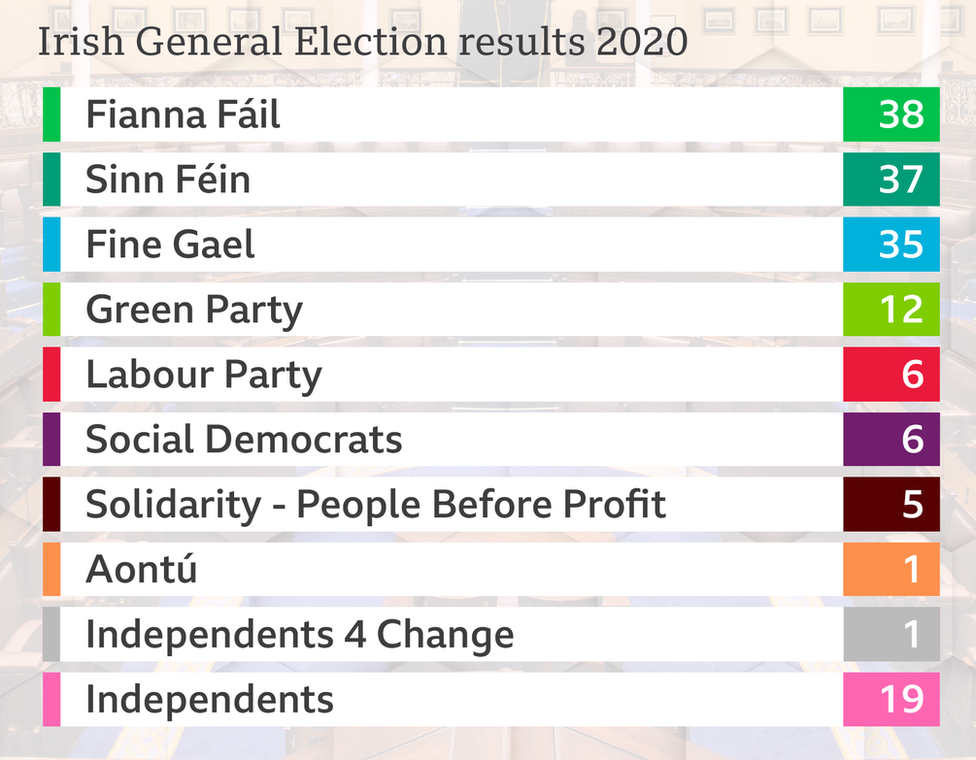
Fianna Fáil and Sinn Féin won the same number of seats, but the Speaker, who was a Fianna Fáil TD, was automatically re-elected
Fianna Fáil TDs privately think that when a new government is eventually formed it will be a grand coalition of Fianna Fáil, Fine Gael and the Greens, who are expected to drive a hard bargain.
Mrs McDonald has described a grand coalition as the "worst outcome" for an electorate that wants change.
But such a development would allow Sinn Féin to be the main opposition and to continue to hammer home the message that the other two big parties ganged-up to deny voters the change they want.
On Thursday afternoon, Sinn Féin will seek to elect Mrs McDonald as taoiseach of a left-wing government that excludes both Fianna Fáil and Fine Gael.
Unless one of those parties abstains she will be rejected as will be Micheál Martin and Leo Varadkar.
There are twists and turns left in this saga of coalition-making and the speed dating will continue.
In the meantime, Mícheál Martin has said another election can't be ruled out after last weekend's indecisive outcome but few people want that and there's nothing like the prospect of the political gallows to concentrate minds when it comes to government formation.
- Published13 February 2020
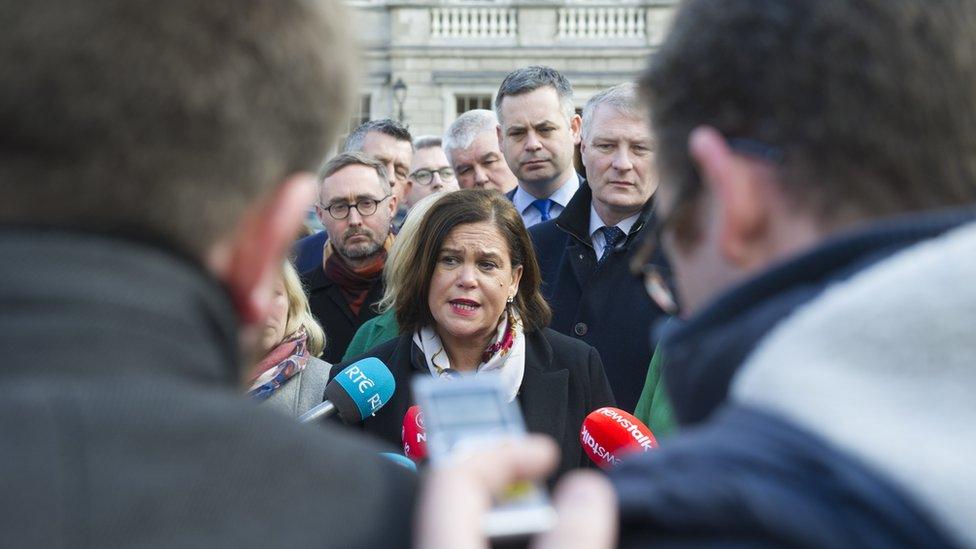
- Published14 February 2020
